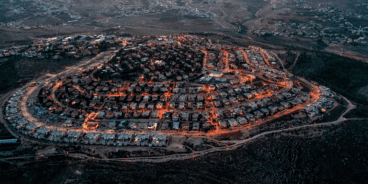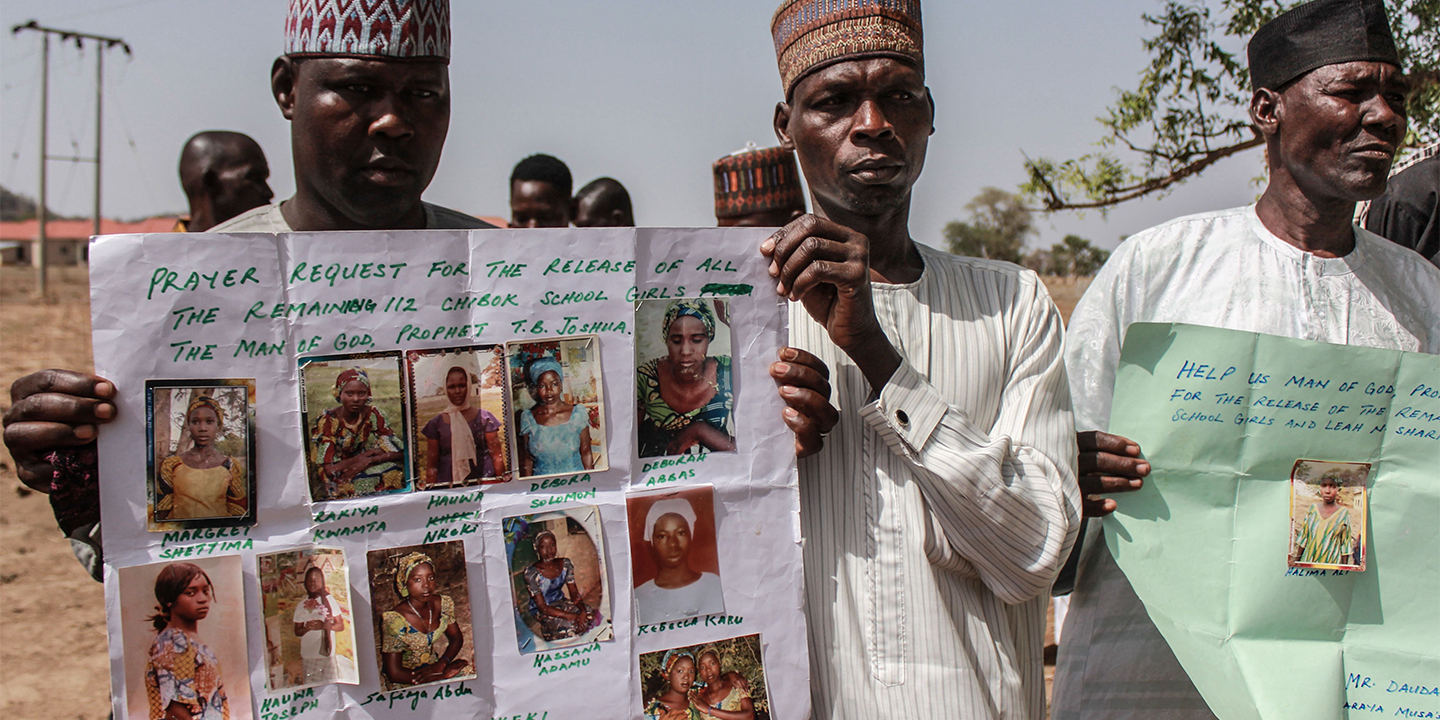

Atrocity Alert No. 386: Nigeria, Israel and the Occupied Palestinian Territory and DR Congo
Atrocity Alert is a weekly publication by the Global Centre for the Responsibility to Protect highlighting situations where populations are at risk of, or are enduring, mass atrocity crimes.
HUNDREDS REMAIN MISSING FOLLOWING MASS ABDUCTIONS ACROSS NIGERIA
At least 560 civilians were kidnapped in four separate incidents across several states in Nigeria over the past two weeks. On 29 February at least 200 people, mainly women and girls, were abducted in northeastern Borno State. According to a statement by the UN Resident and Humanitarian Coordinator in Nigeria, Mohamed Malick Fall, the women were residents of the ISS, Zulum, Kaigama and Arabic camps for internally displaced persons and were outside the camps to collect firewood. Experts reported that the Jama’atu Ahlis Sunna Lidda’adati wal-Jihad faction of Boko Haram is likely responsible for the attack. This is the largest mass kidnapping presumably perpetrated by Boko Haram since 2014, when the armed extremist group abducted more than 270 girls in Chibok.
On 7 March armed bandits surrounded a government-owned school in the town of Kuriga, Kaduna State, and kidnapped 287 students. In response, Cristian Munduate, the UN Children’s Fund Representative in Nigeria, said, “This latest abduction, as any previously, is highly condemnable and part of a worrying trend of attacks on educational institutions in Nigeria, particularly in the northwest, where armed groups have intensified their campaign of violence and kidnappings.” Days later, on 9 March, armed men broke into the Islamic seminary in the village of Gidan Bakuso, Sokoto State, and kidnapped 15 children from the hostel. In another mass kidnapping in Kaduna State, at least 61 people were kidnapped around midnight on Monday, 11 March, when armed bandits attacked Buda, a village approximately 100 miles from Kuriga.
In response, President Bola Ahmed Tinubu announced on X (formerly known as Twitter) that he had directed security and intelligence agencies to immediately launch rescue operations and “to ensure that justice is served against the perpetrators of these abominable acts.” Before being elected as President, Tinubu guaranteed he would “end kidnapping and banditry not only through increasing our policing capacity but also through another soft approach that would promote inclusion and boost the economy of our local communities.” Despite his attempts, local communities feel abandoned by the government as the security situation has further deteriorated in the past year. As a result of insecurity, student enrollments in parts of Nigeria have decreased drastically, impacting the lives and future of millions of children. Nigeria’s armed forces have been deployed to two-thirds of the states in the country and are overstretched as Boko Haram, the so-called Islamic State of West Africa and bandit groups expand their areas of operation.
These non-state armed groups are unlikely to be defeated by counterterrorism operations alone. The government must comprehensively address structural issues of poverty, corruption, youth unemployment and environmental degradation that are exploited by armed groups to recruit and grow. The government should also work together with the UN, local communities and other stakeholders to safeguard schools and educational institutions from threats and violent attacks.
UN FINDS EVIDENCE OF SEXUAL VIOLENCE IN ISRAEL AND THE OCCUPIED PALESTINIAN TERRITORY
The Office of the UN Special Representative of the Secretary-General (SRSG) on Sexual Violence in Conflict found “clear and convincing information” that conflict-related sexual violence – including rape, sexualized torture, cruel, inhuman and degrading treatment – was committed during the brutal Hamas attacks in Israel on 7 October 2023, according to a 4 March press release. The announcement came after Special Representative Pramila Patten and a technical team of experts made an official visit to Israel in early February. During the trip, the team visited locations affected by the 7 October attacks, reviewed extensive images and video footage and conducted dozens of interviews with survivors, witnesses and released hostages, as well as Israeli officials and forces.
According to the press release, conflict-related sexual violence, including rape and gang-rape, occurred in multiple locations. The SRSG’s team documented circumstantial evidence of victims found fully or partially naked, bound and shot across several locations and reported that this may indicate a broader pattern of sexual violence perpetrated on 7 October. The press release specified that there are reasonable grounds to believe that the hostages still being held by Hamas may continue to face sexual violence. The team also found that at least two sexual violence allegations which had been widely reported in the media were unfounded. The mission team further asserted that the actual prevalence of sexual violence during and after the 7 October attacks may never be fully known.
The SRSG and her team also visited the Occupied West Bank regarding allegations of sexual violence perpetrated by Israeli forces and settlers. During the visit, the team received numerous reports of cruel, inhuman and degrading treatment of Palestinians in detention, including various forms of sexual violence. Reporting by the Office of the UN High Commissioner for Human Rights (OHCHR) since 7 October has revealed that Palestinians in Gaza and the Occupied West Bank have been increasingly subjected to mass detention, enforced disappearance and ill treatment which may amount to torture. A recent internal report by the UN Relief and Works Agency for Palestine Refugees describes widespread abuse of Palestinian detainees in Israeli detention centers, including severe physical beatings, waterboarding, prolonged use of stress positions and sexual assault, with the purported aim to force or coerce false confessions regarding links to Hamas.
Over five months have passed since Hamas’ horrific 7 October attacks, while Israel continues the relentless bombardment of and siege on Gaza. Millions of Palestinians, as well as the hostages and their families deserve a complete end to atrocities. There must be an immediate ceasefire in Gaza, a halt to all arms sales to Israel and the unconditional release of all hostages. The Israeli government must grant access to OHCHR and other independent bodies to conduct impartial investigations into alleged violations and abuses of international law, including sexual violence.
ALARMING REPORTS OF SEXUAL VIOLENCE AGAINST WOMEN AND GIRLS IN EASTERN DRC
Reports of grave cases of sexual violence against displaced women and girls, including children as young as nine, have been rising in the Democratic Republic of the Congo’s (DRC) North Kivu province amidst intensifying violence between the March 23 Movement (M23) armed group and government armed forces (FARDC) and its allies. Psychologists working with Save the Children’s local partners in displacement camps have documented “mass events” of sexual violence, including rape and genital mutilation, by armed men who also used objects on women and girls during the attacks, such as tree branches, knives and guns. According to Save the Children, most sexual violence incidents have occurred when survivors are fleeing the clashes and other armed group activity.
Since the beginning of clashes between M23 and the FARDC in March 2022, over 1.6 million people have been displaced, with recent escalations forcibly displacing hundreds of thousands more. The majority of those displaced are sheltering in overcrowded, makeshift sites and collective shelters outside the provincial capital, Goma, where protection measures are insufficient. Displaced women and girls face heightened risks of sexual violence and exploitation, particularly when carrying out livelihood activities in and around camps, including while searching for food, water or firewood. Temporary displacement sites are often surrounded by members of armed groups.
Sexual violence has historically been used as a deliberate weapon of war in the DRC, with thousands of Congolese having survived systematic rape, sexual exploitation, sexual slavery and other forms of gender-based violence. The International Committee of the Red Cross reported that sexual and gender-based violence “became endemic” during the myriad conflicts in DRC and remains a “major concern in this current phase.”
The intensified violence since late January follows several outbreaks of conflict throughout 2023 and M23 recapturing large swathes of territory. In recent weeks, scores of civilians – many of them women and children – have been injured by the use of heavy weapons in populated areas, including around displacement camps. On 6 March M23 reportedly seized the town of Nyanzale, killing at least 15 people in bomb attacks. More than 100,000 people have fled Nyanzale since M23’s advance, according to the UN Office for the Coordination of Humanitarian Affairs.
Survivors need urgent protection, as well as psychosocial and medical support. The international community should scale up humanitarian efforts for displaced populations. All armed actors must take precautions to spare civilians and restrict the use of explosive weapons with wide area effects in populated areas. Congolese authorities and M23 must agree on a lasting ceasefire.
Related Content


Atrocity Alert No. 403: Israel and the Occupied Palestinian Territory, Sudan and the UN Human Rights Council
